- Home
- Rosamunde Pilcher
Under Gemini
Under Gemini Read online
The author and publisher have provided this e-book to you for your personal use only. You may not make this e-book publicly available in any way. Copyright infringement is against the law. If you believe the copy of this e-book you are reading infringes on the author’s copyright, please notify the publisher at: us.macmillanusa.com/piracy.
Contents
Title Page
Copyright Notice
1. Isobel
2. Marcia
3. Rose
4. Antony
5. Anna
6. Jason
7. Tuppy
8. Brian
9. Flora
10. Hugh
St. Martin’s Paperbacks Titles by Rosamunde Pilcher
Enter the Enchanting World of Rosamunde Pilcher …
Copyright
1
ISOBEL
He stood at the window, with his back to her, framed by the faded curtains which she had chosen forty years before. The sun had bleached their bright roses to a faded pink, and the linings were so threadbare that they could no longer be sent to the cleaners for fear of total disintegration. But she loved their familiarity like that of old friends. For years her daughter Isobel had been trying to persuade her to buy new ones, but “They’ll see me out,” Tuppy had said, without thinking very much about it. “They’ll see me out.”
And now it seemed that they were going to do just that. She was seventy-seven and, after a lifetime of unblemished health, had gardened too late and too long, and had caught a chill which turned into pneumonia. She didn’t remember very much about the pneumonia—only that when she emerged from what felt like a long dark tunnel of sheer discomfort, the doctor was calling three times a day and there was a nurse installed to take care of Tuppy. The nurse, a widow from Fort William, was called Mrs. McLeod. She was tall and thin, with a face like a reliable horse, and wore navy blue uniforms with a starched bib to her apron that made her flat chest look like a slab, and shoes that went on forever. Her unprepossessing appearance notwithstanding, she was very kind.
So now the business of dying was no longer a remote and unconsidered possibility, but a cold and immediate fact.
It did not frighten her in the very least, but it was inconvenient. Her thoughts slid, as they so easily did these days, back into the past, and she remembered herself as a young wife, twenty years old, realizing that for the first time she was pregnant. And she had been annoyed and frustrated because it meant that by December she would be round and large as the Albert Hall and unable to go to any of the Christmas dances, and her mother-in-law had comforted her briskly by saying, “There is never a convenient time to have a baby.” Perhaps dying was like that, too. You just had to take it when it came.
It had been a brilliant morning, but now the sun had gone in and a cold light filled the window beyond the doctor’s bulk. “Is it going to rain?” Tuppy asked.
“More like a sea mist,” he told her. “You can’t see the Islands. Eigg disappeared about half an hour ago.”
She looked at him, a big man, solid as a rock, comforting in his well-worn tweeds, standing there with his hands in his pockets as though he had nothing more urgent to do. He was a good doctor, as good as his father had been, though at first it was disconcerting to be taken care of and ordered about by someone you had known as a small sturdy boy in shorts, with his knees covered with grazes and sand in his hair.
Now, as he stood in the light she noticed with a pang that that hair was beginning to gray, just at the temples. This made her feel older than anything, even the thought of dying.
“You’re going gray,” she told him with some asperity, as though he had no right to take such liberties.
He turned, smiling ruefully, putting up a hand to his head.
“I know. The barber pointed it out the other day.”
“How old are you?”
“Thirty-six.”
“Just a boy. You shouldn’t be going gray.”
“Perhaps it’s the wear and tear of looking after you.”
He wore, beneath the tweed jacket of his suit, a knitted pullover. It was becoming unraveled at the neck, and there was a hole in the front in need of mending. Tuppy’s heart bled for him. He was uncared-for, unloved. And he shouldn’t be here at all, buried in the West Highlands, tending to the day-to-day ailments of a community of herring fishers and a handful of scattered crofters. He should be in London or Edinburgh, with a tall important house and a Bentley at the pavement, and a specialist’s plate on the door. He should be teaching or doing research—writing papers and making medical history.
He had been a brilliant student, marvelously enthusiastic and ambitious, and they had all known that ahead of him lay a glittering career. But then he had met that silly girl in London; Tuppy could scarcely remember her name. Diana. He had brought her back to Tarbole and nobody could stand her, but all the objections his father had raised merely stiffened his determination to marry her. (That was in character. Hugh had always been stubborn as a mule and opposition only made him more so. His parent should have recognized this. He handled it all wrong, thought Tuppy, and if old Dr. Kyle had been alive now and available, she would have told him so, mincing no words.)
The misalliance had finally culminated in tragedy, and when it was all over, he had picked up the pieces of his shattered life and come home to Tarbole to take over from his father.
Now he lived alone, like any cheerless, aging bachelor. He was working too hard, and Tuppy knew that he took a good deal less care of himself than he did of his patients, and that more often than not, his supper was a glass of whisky and a pie from the local pub.
She said, “Why doesn’t Jessie MacKenzie mend that jersey for you?”
“I don’t know. Perhaps I forgot to ask her.”
“You should get married again.”
As though deliberately changing the subject, he came back to her bedside. At once the small curled-up ball of fur at the end of Tuppy’s bed resolved itself into an elderly Yorkshire terrier, rearing up from the eiderdown like a cobra and growling ferociously with a great show of teeth sadly depleted by age.
“Sukey!” Tuppy reproved, but the doctor was undismayed.
“It wouldn’t be Sukey if she didn’t threaten to tear my throat out every time I came near you.” He put out a friendly hand, and the growls rose in a tremendous crescendo. He stooped to pick up his bag. “I must go.”
“Who are you going to see now?”
“Mrs. Cooper. And then Anna Stoddart.”
“Anna? What’s wrong with Anna?”
“Nothing’s wrong with Anna. In fact, all is right with Anna. To break a professional confidence, she’s going to have a baby.”
“Anna is? After all this time?” Tuppy was delighted.
“I thought that would cheer you up. But don’t say anything about it. She wants to keep it a secret, for the time being at any rate.”
“I won’t breathe a word. How is she?”
“Fine so far. Not even sick in the mornings.”
“I’ll keep my fingers crossed for her. Oh, she must keep this child. You’ll take good care of her, won’t you? What a silly question, of course you will. Oh, I am pleased.”
“Now. Is there anything else you want?”
She eyed him and the hole in his sweater, and her thoughts moved naturally from babies to weddings, and so, inevitably, to her grandson Antony. She said, “I’ll tell you what I want. I want Antony to bring Rose to see me.”
“… Is there any reason why he shouldn’t?”
His hesitation in replying was so slight that Tuppy told herself she had imagined it. She sent him a sharp glance, but he did not meet it, being occupied with the balky fastening of his bag.
“It’s a month now since they
got engaged,” she went on. “And I want to see her again. It’s five years since she and her mother stayed at the Beach House, and you know, I can scarcely remember what she looks like.”
“I thought she was in America.”
“Oh, she was. She went out after they got engaged. But Antony led me to believe that she’d be back in this country by now. He said he’d bring her up to Scotland, but that’s about as far as it’s got. And I want to know when they intend getting married, and where. There’s such a lot to discuss and settle, and every time I ring Antony up he just sits there in Edinburgh and makes soothing noises. I hate being soothed. I find it very irritating.”
He smiled. “I’ll speak to Isobel about it,” he promised.
“Get her to give you a glass of sherry.”
“I told you, I have to go and see Mrs. Cooper.” Mrs. Cooper was the Tarbole postmistress and a strict teetotaler. “She’s got a low enough opinion of me anyway, without my breathing alcoholic fumes all over her.”
“Stupid woman,” said Tuppy. They smiled, in complete accord, and he went away and left her, closing the door behind him. Sukey crept up the bed and curled herself into the curve of Tuppy’s arm. The window sash rattled slightly as, outside, a wind got up. She looked at the window and saw the misting of rain on the pane. It would soon be lunchtime. She slipped down on the pillows and drifted, as she so easily did these days, back into the past.
Seventy-seven. What had happened to the years? Old age seemed to have taken her unaware and totally unprepared. Tuppy Armstrong was not old. Other people were old, like one’s own grandmother, or characters in books. She thought of Lucilla Eliot, in The Herb of Grace. The epitome, one would have thought, of a perfect matriarch.
But Tuppy had never liked Lucilla. She thought her possessive and domineering. And she abhorred the snobbery of Lucilla’s beautifully cut black frocks. Tuppy had not owned a beautifully cut black frock in the whole of her life. A lot of pretty dresses, certainly, but never a beautifully cut black frock. Most of the time she existed contentedly in antique tweed skirts and cardigans with darns in the elbows: sturdy, indestructible clothes which did not object to a spot of rose pruning or a sudden shower of rain.
And yet, on the appropriate occasion there was nothing like the old blue velvet dinner dress for making one feel rich and feminine. Especially if you splashed some eau de cologne around and jammed the old-fashioned diamond rings over the arthriticky joints of your fingers. Perhaps when Antony brought Rose they would have a dinner party. Nothing elaborate. Just a few friends. She imagined the white Irish linen mats and the silver candlesticks and a centerpiece of creamy Peace roses.
An enthusiastic hostess, she began to plan. And if Antony and Rose were to be formally married, then a list must be made of guests to be asked on the Armstrong side of the family. Perhaps Tuppy should do that now and give it to Isobel, so that Isobel should know who to ask. Just in case …
Suddenly, it didn’t bear thinking about. She drew Sukey’s little body tightly to hers and kissed the top of the bedraggled, slightly smelly head. Sukey aimed a cursory lick in her direction and went back to sleep. Tuppy closed her eyes.
* * *
Descending, Dr. Hugh Kyle reached the turn of the stairs and there stopped, his hand on the banister. He was troubled. Not solely for Tuppy, but also on account of the conversation he had just had with her. As he stood there, a preoccupied, solitary figure neither upstairs nor down, his anxieties and responsibilities were mirrored on his frowning face.
Below him the big hall stood empty. At the far side, glass doors gave onto the terrace, the sloping garden, and the sea, all drowned now in mist. He saw the polished floors, the worn rugs, the old chest with its copper bowl of dahlias, the slowly ticking grandfather clock. There were as well other, less picturesque bits of evidence of Armstrong family life: Jason’s battered tricycle, pulled in out of the rain; the dogs’ baskets and their drinking bowls; a pair of muddy gumboots, abandoned until such time as their owner remembered to put them away in the cloakroom. To Hugh, it was all familiar from the beginning of time, for he had known Fernrigg all his life. But now it seemed as though the very house was waiting and watching for news of Tuppy.
There did not seem to be anybody about, although this was not surprising. Jason was at school; Mrs. Watty would be in the kitchen, busy with lunch. Isobel—he wondered where he would find Isobel.
Just as the question entered his mind, he heard her footsteps coming across the drawing room floor, and the scratch of Plummer’s paws on the patches of parquet between the rugs. The next moment she appeared through the open door, with the fat old spaniel hard on her heels.
She saw Hugh at once, and stopped dead, tilting back her head to look up at him. They stared at each other and then, recognizing his own anxieties reflected in her eyes, he hastily pulled himself together, rearranging his features into an expression of robust cheerfulness.
“Isobel, I was wondering where I’d find you.”
She said, in no more than a whisper, “Tuppy?”
“Not too bad.” Swinging his bag, his other hand in his trouser packet, he came downstairs.
“I thought … When I saw you standing there … I thought…”
“I’m sorry, I was thinking about something else. I didn’t mean to give you a fright.…”
She was unconvinced, but she tried to smile. She was fifty-four, the gawky stay-at-home daughter who had never married, instead spilling the intensity of her affection onto her mother, the house, the garden, her friends, her dog, her nephews, and now Jason, the little great-nephew who had come to live at Fernrigg House while his parents were abroad. Her hair, which had been flaming red when she was a girl, was now sandy and streaked with white, but the style had not changed as long as Hugh could remember. Nor had the expression on her face, still child-like and innocent, perhaps on account of the sheltered life she had led. Her eyes were blue as a child’s and sensitive as the sky on a squally day, reflecting every emotion like a mirror: shining with pleasure, or brimming with the tears over which she had never had any control.
Now, looking up at him, they were filled with anguish, and it was obvious that Hugh’s hearty manner had done nothing to reassure her.
“Is she … is she going to…?” Her lips could not, would not, frame the dreaded word. He put a hand beneath her elbow and ushered her firmly back into the drawing room and shut the door behind them.
“She may die, yes,” he told her. “She’s not a young woman and she’s taken a battering. But she’s tough. Like an old heather root. She has a good chance of pulling through.”
“I can’t bear the thought of her being an invalid—not being able to get about and do all the things she wants to do. She would hate it so much.”
“Yes, I know. I do know.”
“What can we do?”
“Well…” He cleared his throat, running a hand down the back of his neck. “There is one thing which I think would cheer her up, and that would be for Antony to come over and perhaps bring that girl he’s engaged to…”
Isobel rounded on him. She, too, could remember him as a little boy, and sometimes a very tiresome one. “Hugh, don’t call her ‘that girl’ in that horrid way. She’s Rose Schuster and you know her as well as we all do. Not that that’s very well, I admit, but at least you do know her.”
“I’m sorry.” Isobel was always fiercely protective of any person even remotely connected with the family. “Rose, then. I think Tuppy’s longing to see her again.”
“We all are, but she’s been with her mother in America. The trip was all planned before she and Antony got engaged.”
“Yes, I know, but she may be back by now. And Tuppy’s fretting about it. Perhaps Antony could be nudged a little, persuaded to get Rose north and bring her over, even if it’s only for a weekend.”
“He always seems to be so busy.”
“I’m sure if you explained the situation.… Tell him that perhaps it would be better not to put it off
too long.”
As he feared, Isobel’s eyes became instantly bright with tears. “You do think she’s going to die.” Already she was fumbling up her sleeve for a handkerchief.
“Isobel, I didn’t say that. But you know how Tuppy is about Antony. He’s more of a son than a grandchild. You can see how much it means to her.”
“Yes. Yes, I do see.” Bravely Isobel blew her nose and stowed away her handkerchief. Searching for some diversion, her eyes alighted on the sherry decanter. “Have a drink.”
He laughed, easing the tension. “No, I won’t, thank you. I’m going to see Mrs. Cooper. She’s got palpitations again, and they’ll worsen if she thinks I’ve been drinking.”
Isobel smiled, too, despite herself. Mrs. Cooper had always been something of a family joke. Together they went out of the room and across the hall. Isobel opened the front door onto the chill of the damp, mist-shrouded morning. The doctor’s car, parked at the foot of the steps, was wet with rain.
He said, “And promise to ring me if you’re the least bit worried.”
“I will. But with Nurse here, I know I won’t worry so much.”
It was Hugh who had insisted that they get a nurse. Otherwise, he said, Tuppy must go into a hospital. On being faced with the daunting prospect of a resident nurse, Isobel’s mind had shot off at panicky tangents. Tuppy must be very ill; and where would they find a nurse? And would Mrs. Watty raise objections? And would there be umbrage taken and bad feeling in the kitchen?
But Hugh had seen to it all. Mrs. Watty and Nurse had made friends, and Isobel was able to sleep at nights. He was, in truth, a tower of strength. Seeing him off Isobel asked herself, perhaps for the hundredth time, what they would all do without him. She watched him get into his car and drive away, down the short drive between the sodden rhododendrons, past the lodge where the Wattys lived, and through the white gates which were never closed. She waited until he had gone. The tide was at the flood, and she could hear the gray waves breaking against the rocks below the garden.
She shivered, and returned indoors to phone Antony.

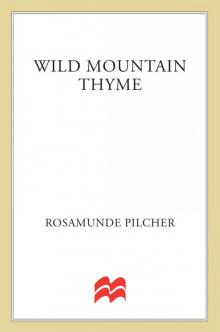 Wild Mountain Thyme
Wild Mountain Thyme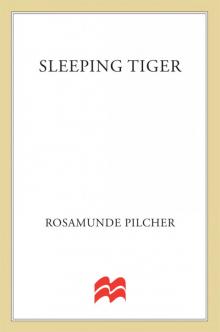 Sleeping Tiger
Sleeping Tiger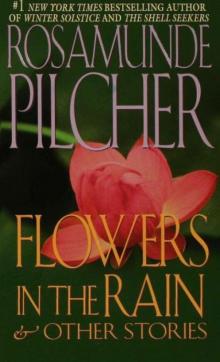 Flowers in the Rain & Other Stories
Flowers in the Rain & Other Stories September
September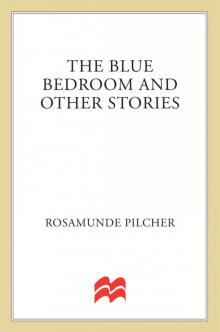 The Blue Bedroom: & Other Stories
The Blue Bedroom: & Other Stories The Carousel
The Carousel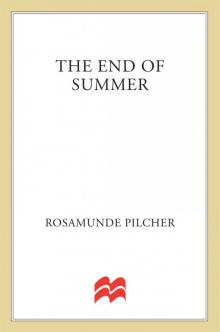 The End of Summer
The End of Summer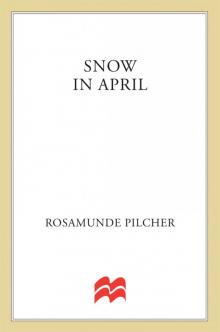 Snow in April
Snow in April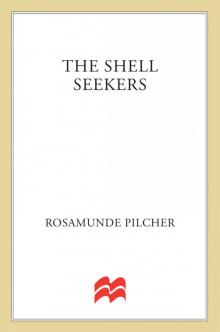 The Shell Seekers
The Shell Seekers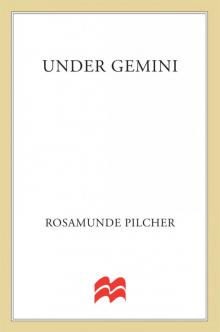 Under Gemini
Under Gemini The Empty House
The Empty House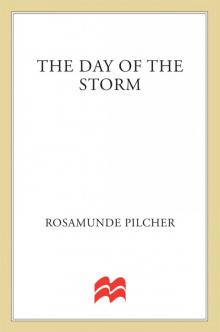 The Day of the Storm
The Day of the Storm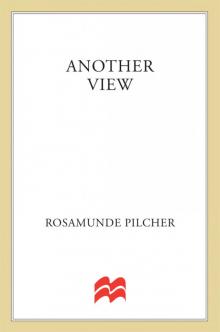 Another View
Another View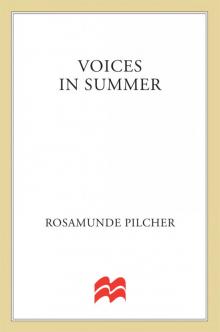 Voices in the Summer
Voices in the Summer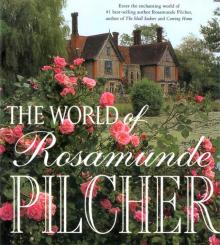 The World of Rosamunde Pilcher
The World of Rosamunde Pilcher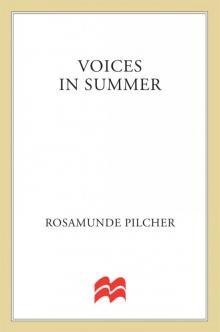 Voices In Summer
Voices In Summer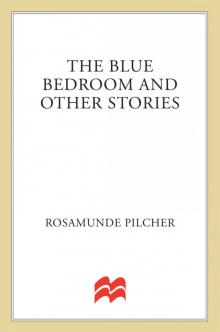 Blue Bedroom and Other Stories
Blue Bedroom and Other Stories